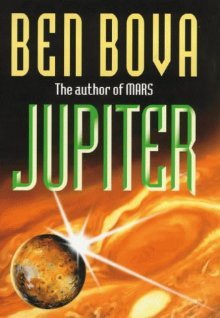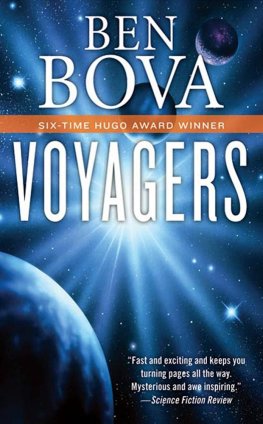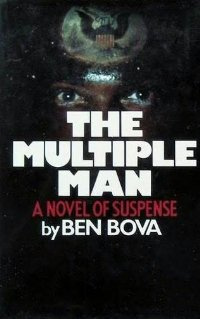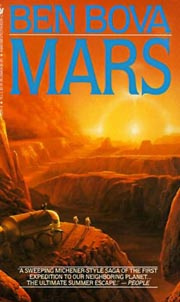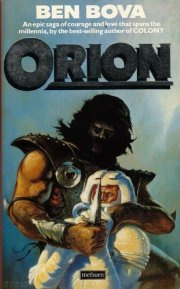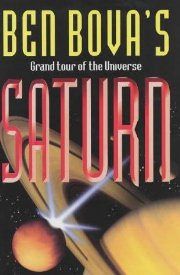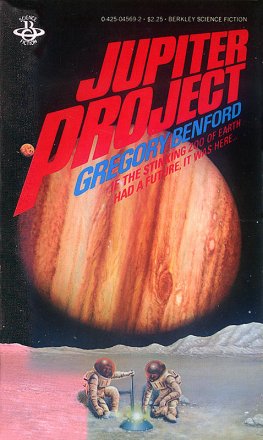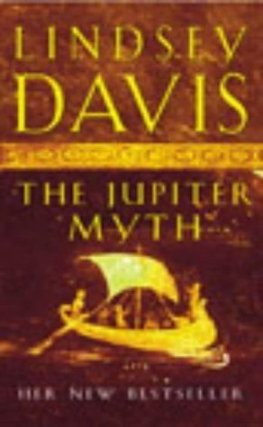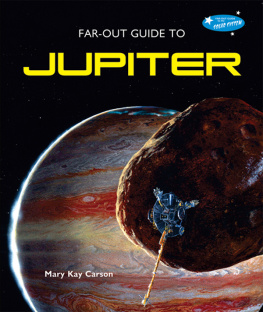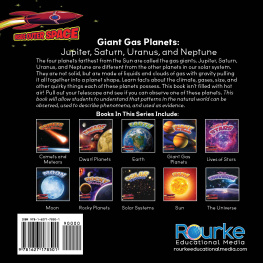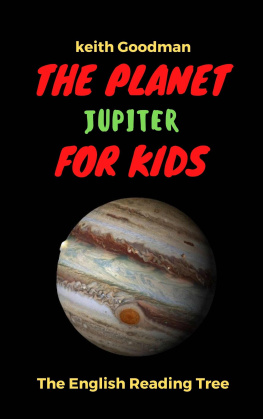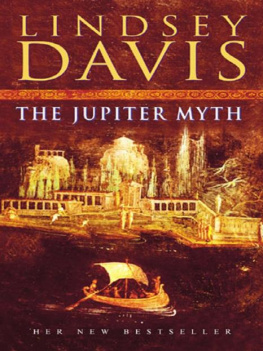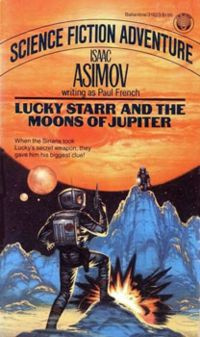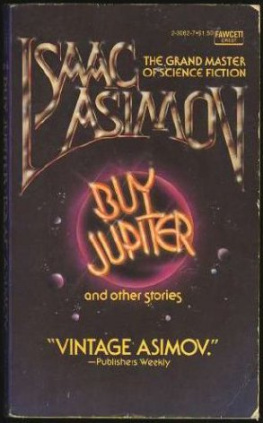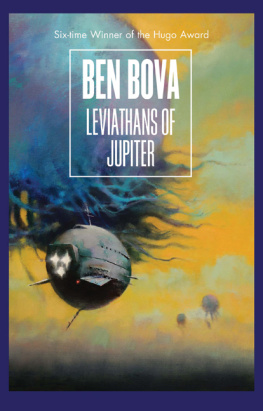Ben Bova - Jupiter
Here you can read online Ben Bova - Jupiter full text of the book (entire story) in english for free. Download pdf and epub, get meaning, cover and reviews about this ebook. year: 2000, publisher: Hodder & Stoughton, genre: Science fiction. Description of the work, (preface) as well as reviews are available. Best literature library LitArk.com created for fans of good reading and offers a wide selection of genres:
Romance novel
Science fiction
Adventure
Detective
Science
History
Home and family
Prose
Art
Politics
Computer
Non-fiction
Religion
Business
Children
Humor
Choose a favorite category and find really read worthwhile books. Enjoy immersion in the world of imagination, feel the emotions of the characters or learn something new for yourself, make an fascinating discovery.
- Book:Jupiter
- Author:
- Publisher:Hodder & Stoughton
- Genre:
- Year:2000
- ISBN:0-340-76764-2
- Rating:3 / 5
- Favourites:Add to favourites
- Your mark:
- 60
- 1
- 2
- 3
- 4
- 5
Jupiter: summary, description and annotation
We offer to read an annotation, description, summary or preface (depends on what the author of the book "Jupiter" wrote himself). If you haven't found the necessary information about the book — write in the comments, we will try to find it.
Jupiter — read online for free the complete book (whole text) full work
Below is the text of the book, divided by pages. System saving the place of the last page read, allows you to conveniently read the book "Jupiter" online for free, without having to search again every time where you left off. Put a bookmark, and you can go to the page where you finished reading at any time.
Font size:
Interval:
Bookmark:
Ben Bova
Jupiter
PROLOGUE:
ORBITAL STATION GOLD
It took six of them to drown him.
Reluctantly, grudgingly, Grant Archer had stripped himself naked, as they had ordered him to do. But once they pushed him to the edge of the big tank, he knew he would not go into it without a fight.
The augmented gorilla grabbed Grants right arm; she was careful not to snap his bones, but her powerful grip was painful all the same. Two of the human guards held his left arm while a third wrapped him around the middle and still another lifted his bare feet off the deck so he couldnt get any leverage for his wild-eyed struggles.
All this in nearly total silence. Grant didnt scream or roar at them, he didnt plead or curse. The only sounds were the scuffing of the guards boots on the cold metal deck plates, the hard gasps of their labored breathing, and Grants own panicked, desperate panting.
The guard captain grimly, efficiently grasped Grants depilated head in both big meaty hands and pushed his face into the tank of thick, oily liquid.
Grant squeezed his eyes shut and held his breath until his chest felt as if it would burst. He was burning inside, suffocating, drowning. The pain was unbearable. He couldnt breathe. He dared not breathe. No matter what they had told him, he knew down at the deepest level of his being that this was going to kill him.
No air! Cant breathe!
Reflex overpowered his mind. Despite himself, despite his terror, he sucked in a breath. And gagged. He tried to scream, to cry out, to beg for help or mercy. His lungs filled with the icy liquid. His whole body spasmed, shuddered with the last hope of life as they pushed his naked body all the way into the tank with a final pitiless shove and he sank down, deeper and deeper.
He opened his eyes. There were lights down there. He was breathing! Coughing, choking, his body racked with uncontrollable spasms. But he was breathing. The liquid filled his lungs and he could breathe it. Just like regular air, they had told him. A lie, a vicious lie. It was cold and thick, utterly foreign, alien, slimy and horrible.
But he could breathe.
He sank toward the lights. Blinking, squinting in their glare, he saw that there were other naked hairless bodies down there waiting for him.
Welcome to the team, a sarcastic voice boomed in his ears, deep, slow, reverberating.
Another voice, not as loud but even more basso profundo, said, Okay, lets get him prepped for the surgery.
BOOK I
My God, my God, why hast Thou forsaken me?
Far from my deliverance are the words of my groaning.
Psalm 22GRANT ARMSTRONG ARCHER III
Despite being born into one of the oldest families in Oregon, Grant Archer grew up in an environment that was far from affluent. His earliest memories were of watching his mother rummaging through piles of hand-me-down clothes at the Goodwill shop, looking for sweaters and gym shoes that werent too shabby to wear to school.
His father was a Methodist minister in the little suburb of Salem where Grant grew up, respected as a man of the cloth but not taken too seriously in the community because he was, in the words of one of the golf club widows, churchmouse poor.
Poor as far as money was concerned, but Grants mother always told him that he was rich in the gift of intelligence. It was his mother, who worked in one of the multifarious offices of the New Morality in the state capital, who encouraged Grants interest in science.
Most of the New Morality officials were suspicious of science and scientists, deeply worried about these humanists who so often contradicted the clear word of Scripture. Even Grants father urged his son to steer clear of biology and any other scientific specialty that would bring the frowning scrutiny of New Morality investigators upon them.
For Grant there was no problem. Since hed been old enough to look into the night sky with awe and wonder hed wanted to be an astronomer. In high school, where he was by far the brightest student in his class, he narrowed his interest to the astrophysics of black holes. Although Grant thrilled to the discoveries on Mars and out among the distant moons of Jupiter, it was the death throes of giant stars that truly fascinated him. If he could learn how collapsed stars warped spacetime, he might one day discover a way for humans to use such warps for interstellar journeys.
He longed to work at the Farside Observatory on the Moon, studying collapsed stars far out in the cold and dark of deep interstellar space. Yet Grant had been warned that even at Farside there were tensions and outright dangers. Despite all the strictures of the New Morality and the stern rules laid down by the observatorys directors, some astronomers still tried to sneak time on the big telescopes to search for signs of extraterrestrial intelligence. When such prohibited activities were discovered, those responsible were inevitably sent back to Earth in disgrace, their careers blighted.
That did not bother Grant, however. He intended to keep his nose clean, to avoid antagonizing the everpresent agents of the New Morality, and to study the enigmatic and entirely safe black holes. He was careful never to use the dreaded word evolution when speaking about the life cycles of stars and their final collapse into black holes. Evolution was a dangerous word among the New Morality eavesdroppers.
By the time he was finishing high school, he had grown into a quiet, square-shouldered young man with a thick thatch of sandy-blond hair that often tumbled over his light-brown eyes. He was good-natured and polite; the high school girls considered him a delta in their merciless rating system: okay as a friend, especially when it came to help with schoolwork, but too dull to date except in an emergency. A shade under six feet tall and whipcord lean, Grant played on the schools baseball and track teams, no outstanding star but the kind of reliable performer who made his coaches sleep better at night.
As his senior year approached, Grant was offered a full scholarship in return for a four-year commitment to Public Service. The service was inescapable: Every high school graduate was required to do at least two years and then another two at age fifty. The New Morality advisor in his high school told Grant that by accepting a four-year term now, he could get a full scholarship to the university of his choice, with the understanding that his Public Service would be in the field for which he was trained: astrophysics.
Grant accepted the scholarship and the commitment, his eyes still on Farside. He went to Harvard and, much to his delighted surprise, fell in love with a raven-haired biochemist named Marjorie Gold. She made him feel important, for the first time in his life. When he was with her, the quiet, steady, sandy-haired young astronomy student felt he could conquer the universe.
They married during their senior year even though he knew hed be off to the Farside Observatory for four years while Marjorie would be doing her Public Service with the International Peacekeeping Force, tracking down clandestine biological warfare factories in the jungles of southeast Asia and Latin America.
But they were young and their love could not wait. So they married, despite their parents misgivings.
Ill come down from Farside at least every few months, Grant told her as they lay together in bed, contemplating the next four years.
Ill get leave when youre here, Marjorie agreed.
By the time Im finished my four years Ill have my doctorate, he said.
Then you can get on a tenure track at any university you like.
And after the four years is over we can apply to have a child, Grant said.
A boy, said Marjorie.
Dont you want a daughter?
Afterward. After I learn how to be a mother. Then we can have a daughter.
Font size:
Interval:
Bookmark:
Similar books «Jupiter»
Look at similar books to Jupiter. We have selected literature similar in name and meaning in the hope of providing readers with more options to find new, interesting, not yet read works.
Discussion, reviews of the book Jupiter and just readers' own opinions. Leave your comments, write what you think about the work, its meaning or the main characters. Specify what exactly you liked and what you didn't like, and why you think so.

